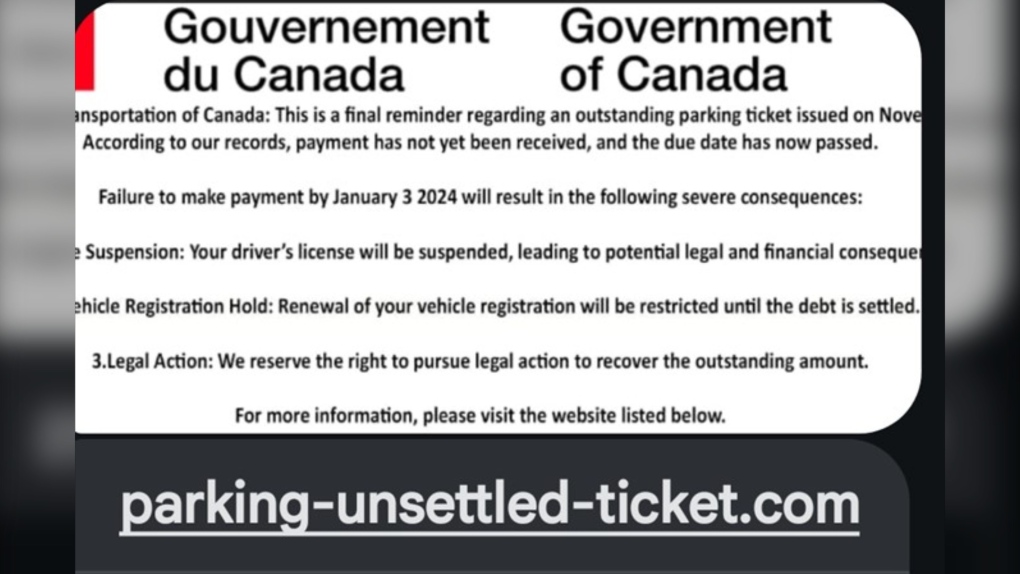Police warn about ‘aggressive text scam’ circulating locally
 (Torsten Dettlaff/Pexels)
(Torsten Dettlaff/Pexels)
The Barrie police fraud unit is warning residents about an “aggressive text messaging scam” it says is circulating locally.
Police say the text will appear to be from Revenue Canada and threatens to suspend the recipient’s driver’s licence if the individual doesn’t click the link provided to pay unpaid fines.
Barrie police say one victim clicked the link to pay the alleged fine and the following day, an airline ticket was charged to the credit card the victim had supplied.
- Download the CTV News app free for local alerts
- Get the latest local updates and breaking news sent to your inbox
Police say the texts are associated to an alleged fine from a photo radar camera or a parking infraction.
 Police provided an image of a text scam that appears to be from the Canadian Revenue Agency. (Barrie Police Services)
Police provided an image of a text scam that appears to be from the Canadian Revenue Agency. (Barrie Police Services)
“Revenue Canada does not collect money for unpaid fines – plain and simple,” the local police service noted.
“The scam is a form of phishing and once these scammers have your credit card information, your nightmare will begin as they will make unauthorized purchases, often long before you realize what is taking place and cancel the credit card,” police warned.
Recognize the Signs
The Canadian Anti-Fraud Centre states the CRA will never send refunds via text message or demand payment.
It will also never threaten to deport, arrest or imprison anyone, use aggressive language, set up an in-person meeting to collect payment, or ask for personal or financial information in a text.
The CRA will only contact an individual by phone, automated message, letter or email.
“The CRA only sends text messages for multi-factor authentication for all of its sign-in services and to enroll with the telephone option,” the fraud centre stated. "The CRA will not use text messages or instant messaging such as Facebook Messenger or WhatsApp."
What to Do
The Barrie police fraud unit says the best course of action is to play it safe and delete a text message demanding payment.
Never reply to a potential scam sent via text or email, and avoid providing any personal or financial information.
Additionally, stay away from clicking links sent via text that claim to be from the CRA.
Police suggest always taking a moment before taking action to do your research. Reach out to CRA to find out the legitimacy of the claim, or contact the authorities.
CTVNews.ca Top Stories

W5 Investigates 'I'm in financial ruin': Canadian homeowners sound alarm over contractor accused of fraud
This W5 investigation focuses on mother and daughter homeowners who found themselves in a fight with a general contractor over money they say they're owed, and over work that was never completed on their dream home.
'What are we talking about?' Experts respond to Trump's 'economic force' comments
Incoming U.S. president Donald Trump's threats to use 'economic force' against Canada and its industries are sparking worry and disbelief.
Thousands flee as wildfires burn out of control in and around Los Angeles and homes are destroyed
California firefighters battled wind-whipped wildfires that tore across the Los Angeles area, destroying homes, clogging roadways as tens of thousands fled and straining resources as the fires burned uncontained early Wednesday.
Is Donald Trump kidding? Americans in Canada react to tariff, annexation threats
While Donald Trump's comments on tariffs and Canada becoming 'the 51st state' have drawn anger and fear among Canadians, reaction from Americans who live, study or work in Canada has been mixed, and is largely influenced by how they voted in the presidential election.
Thinking of a career change? Here's what employers are hiring for this year
As 2025 gets into full swing, gaps in Canada's job market offer new opportunities to start fresh -- in some sectors, more than others.
Liberal MPs gather for first time since Trudeau announced his resignation plans
Liberal MPs are meeting in Ottawa today for the first time since Prime Minister Justin Trudeau announced he will step down.
A B.C. mom's real-life nightmare and the search to find her trafficked daughter
A Vancouver island mom shares the story of what happened to her teenaged daughter – and a warning for other parents about sex trafficking.
Trump is open to using 'economic force' to acquire Canada; Trudeau responds
Prime Minister Justin Trudeau said 'there isn't a snowball's chance in hell that Canada would become part of the United States,' on the same day U.S. president-elect Donald Trump declared that he's open to using 'economic force' to acquire Canada.
EU will not tolerate attacks on its borders, France says after Trump Greenland comments
The European Union will not let other nations attack its sovereign borders, France's foreign minister said on Wednesday, responding to comments by U.S. president-elect Donald Trump on taking over Greenland.

































